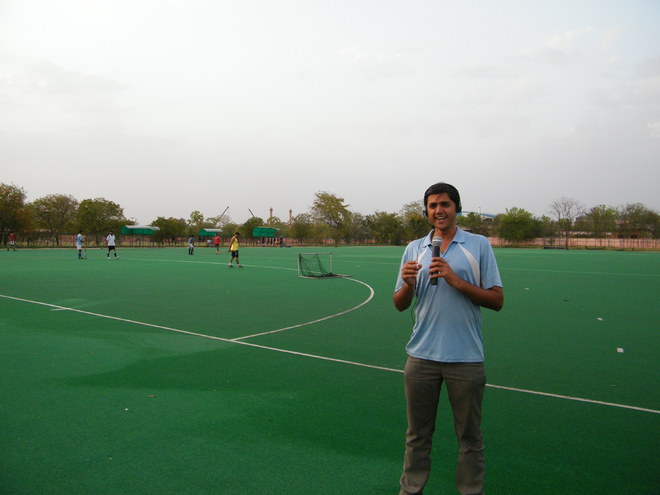
Devendra Kumar turns to BBC for learning English and rudiments of sports commentary
Subhash Rajta
“The little man has hit the big fella for a six! He’s half his size!” That was Tony Greig, one of the best commentators ever, at his delighted and excited best, telling the world how Sachin Tendulkar had just smashed Tom Moody into the stands during the innings that came to be known as Desert Storm. Both Tendulkar and Greig were on fire that evening in Sharjah in 1998— the Little Master couldn’t have played better; the latter couldn’t have described it better.
The duo, through their unmatched craft, brought loads of joy to millions of fans that evening.
In a small village in Jodhpur district in Rajasthan, an 11-year-old had just caught a slice of the heady action on BBC, on a radio his father, a soldier, had brought for his grandfather. Grieg’s booming voice ‘the little man….’ refused to leave his head that night, or the next night. In fact, it made a permanent place there.
“I didn’t understand a thing he was saying. His booming voice, drenched in delight and excitement, left me awestruck. I felt an instant and irresistible urge to speak like him, be like him and do whatever he was doing. It was love at first sound for me,” says Devendra Kumar, who has held on to his dream steadfastly even after 17 years since that life-changing evening.
Devendra, now 28, still has a long way to go before he fulfils his dream “to become one of the finest commentators for the BBC, the ABC and the ESPN Star Sports”. And he is getting there slowly and steadily. He has commented on Ranji one-day final on All-India Radio, has assisted Laxman Sivaramakrishnan during the Irani Cup final on Neo TV, and did pre-match and post-match analysis for India News and a couple of regional channels during the ICC World Cup. “I recently sent my audio clips to the BBC and the channel liked it. The authorities told me I need to arrange a working visa if I was keen to do commentating for them. Let’s see where it goes,” says Devendra.
“I just need a month-long internship with some broadcaster to fine-tune my skills. Otherwise, I am as ready as I possibly could be. Cricketer Yuvraj Singh has promised to help me in whichever way he can... I am quite hopeful of hearing from him soon enough.”
It’s difficult to tell how far he will go from here. But how far he’s already come, considering the odds he had to beat, is no small matter either.
For starters, he didn’t know a thing about the language he wanted to commentate in; nor did know the sport he wanted to tell the world about. Worse still, there was little opportunity to learn either. “Our village school, up to Class XII, taught even Hindi in Marwari,” Devendra chuckles, “there’s no way I could have learnt the language there.” The scenario was equally bleak on sporting front too. “You can’t play cricket on sand,” he explains.
So it was radio, especially the BBC, he turned to for his daily dose of learning the English language and rudiments of sports commentary. “I was simply hooked even though I could not understand a word of it. All I could pick up for a long while was, ‘it’s a four’ or “that’s gone for a six’. And I would shout out those words, trying to say it exactly the way I heard it on the radio, during the occasional cricket tournaments played in less sandy villages, a few miles away from our village.”
In 2003, he came to Jaipur to realise the dream he had been nurturing for years. “I was naïve enough to think that I just had to show up and I will land a commentary job. I was ridiculed, even dragged out of the Sawai Mansingh Stadium once. I had little money, no support, couldn’t have gone home… it was pretty rude wake-up call.”
To his credit, he used the setbacks for introspection. And he wasn’t happy with what he found out — he realised that he needed to work a lot more on his language skills and his knowledge of the game. And with that began his persistent routine that he follows till date – he begins the day with mediation to achieve focus, recitation of mantras for vocal clarity, visits library to read up everything on sports, regular visits to various sports centres in the city to observe the nuances of the game and to polish his commentary skills, and then listen to commentary on radio and TV well into the middle of the night.
Hasn’t the long struggle tired him out? We get our answer in a Facebook post he has shared — Good things come to those who work hard and never give up.



























